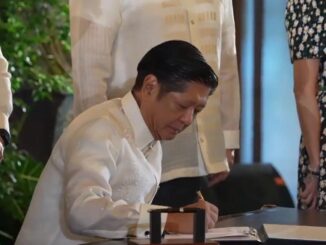
President Ferdinand “Bongbong” Marcos Jr. on Tuesday approved the proposal to create a Cabinet cluster for education with the aim of addressing gaps in the sector, according to Education Secretary Sonny Angara.
The cluster will be composed of the Department of Education (DepEd), the Commission on Higher Education (CHED), and the Technical Education and Skills Development Authority (TESDA), Angara said.
The Department of Labor and Employment (DOLE) and the Department of Budget and Management (DBM), the DepEd chief added, would also be involved in the cluster.
“We’re very thankful to the President for his swift action actually,” Angara told Palace reporters during a press briefing.
“The President basically sa bandang dulo ng meeting, sinabi na niya in principle he approves of it, he’d like us to fast track some of the actions dahil nakikita niya ‘yung urgency and it’s a very deep-seated problem. Medyo matagal-tagal na na nangangailangan tugunan. Sabi niya, ‘talagang kailangan itong cluster,'” he added.
(Towards the end of the meeting, the President basically said in principle that he approves of it, he’d like us to fast track some of the actions because he sees its urgency. It’s a very deep-seated problem. Its solution is long overdue. The President said, ‘we really need this cluster.’)
For his part, Second Congressional Commission on Education (EDCOM II) executive director Karol Mark Yee said the cluster would formulate a 10-year integrated national education and workforce development plan.
Yee said the agency targets and budget should be aligned to support the plan on a yearly basis.
“Sabi niya, ‘We don’t have a system, we have different things happening but not working together. We need to fix that,”‘ Yee said.
(The President said, ‘We don’t have a system, we have different things happening but not working together. We need to fix that.)
The EDCOM II earlier suggested the establishment of a Cabinet cluster for education under the Office of the President “to ensure a cohesive and coherent implementation of all laws, policies, and reforms” on education across all government and non-government stakeholders.
READ: LAST OF THREE PARTS
The Cost of Miseducation: Task at hand for PH education
In 2000, the National Coordinating Council for Education (NCCE) was formed almost a decade after the EDCOM I proposed its creation in a bid to “mitigate the risk of nonalignment” between the education sub-sectors composed of DepEd, CHED, and TESDA.
However, the NCCE was abolished seven years later after failing to do its expected roles. — VDV, GMA Integrated News





Be the first to comment